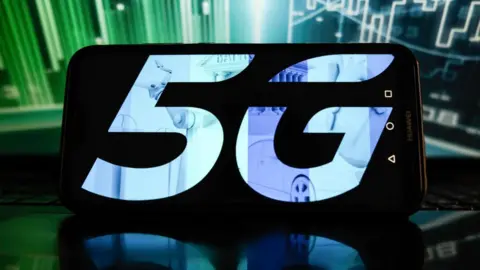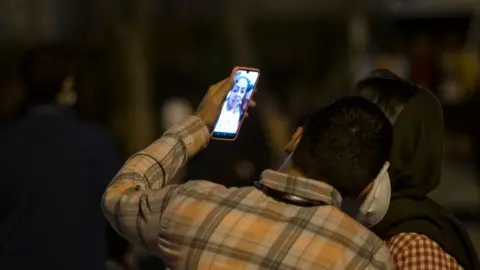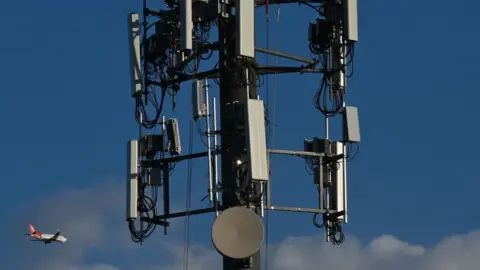Ambani and Adani: Asia's richest men battle to dominate 5G in India
 Getty Images
Getty ImagesIndia's largest auction for 5G airwaves has ended after seven days, potentially setting the stage for a battle of supremacy over India's digital future between two of Asia's richest men - Gautam Adani and Mukesh Ambani.
A total of 72 gigahertz of spectrum was on the block in the auction. Ashwini Vaishnaw, India's telecoms minister, said 71% of what was on offer was sold.
The government drew bids worth approximately $19bn from the three current players - Mr Ambani's Reliance-Jio or (R-Jio), Vodafone Idea and Bharti Airtel - and from a fourth, new entrant, Adani Data Networks.
This surpassed expectations as total bids had more than doubled since the last auction in March 2021, according to CRISIL Research.
While R-Jio emerged as the largest bidder, buying spectrum worth $11bn, the Adani group spent only about $26m. The remaining bids came from Bharti Airtel and Vodafone Idea.
While Bharti Airtel and R-Jio reportedly bid for pan-India airwaves, cash-strapped Vodafone Idea spent only in priority sectors.
"Jio is fully ready for 5G rollout in the shortest period of time because of its nationwide fibre presence... and strong global partnerships across the technology ecosystem," R-Jio said in a statement.
The Adani Group bid on private spectrum that would be accessible in specific areas such as ports or airports - a sector in which the company has already heavily invested.
Mr Ambani's R-Jio is now a familiar name in India's internet market, Mr Adani is a surprise bidder - he controls a sprawling business that spans ports, airports and power, and recently displaced Bill Gates to become the world's fourth-richest person, with a net worth more than $112bn.
 Getty Images
Getty ImagesWhile the Adani Group has said it was not interested in competing in the wider market outside of private spectrum, analysts say this could just be the first step in that direction.
"We believe if the Adani Group does end up buying spectrum in the upcoming auction, it could potentially increase competition... in addition to opening the doors for the Adani Group to expand into consumer mobile services over time," Goldman Sachs said in a note.
The move will make Vodafone Idea and Bharti Airtel jittery - the two telecom firms are still reeling from the tariff wars launched by R-Jio's disruptive 2016 entry when it slashed prices. Now, they face the possibility of more competition from yet another deep-pocketed billionaire.
For Mr Ambani, it's an unexpected face-off with a rival who's so far steered clear of what is seen as his turf.
The introduction of 5G in India is likely to usher in a new era of high-speed internet, allowing video downloads in seconds and enabling the use of advanced connected devices through cloud computing technologies.
 Getty Images
Getty ImagesWith higher speeds on offer, Indian telecom companies are expected to benefit from charging higher prices for 5G - they have so far refrained from charging more for 4G plans as compared to 2G or 3G plans.
5G tariff plans will likely lead to higher revenues for telecom companies, according to a note from Nomura.
But India will take to 5G slowly, especially given the likelihood of higher prices - and the fact that only about 7% of India's overall smartphone base is 5G-enabled.
But record proceeds from the auction - the highest compared to the previous seven rounds since 2010 - will help shore up the government's finances at a time when India's fiscal deficit - the gap between revenues and expenditure - is expected to hit 6.4%.
Analysts estimate that India's Department of Telecommunications will receive $1.6bn upfront over the next 20 years.
The government is expected to finish allocating airwaves by August and start rolling out 5G services in early October this year.
"Within a year or so, we should have a good rollout of 5G in the country," Mr Vaishnaw said.
